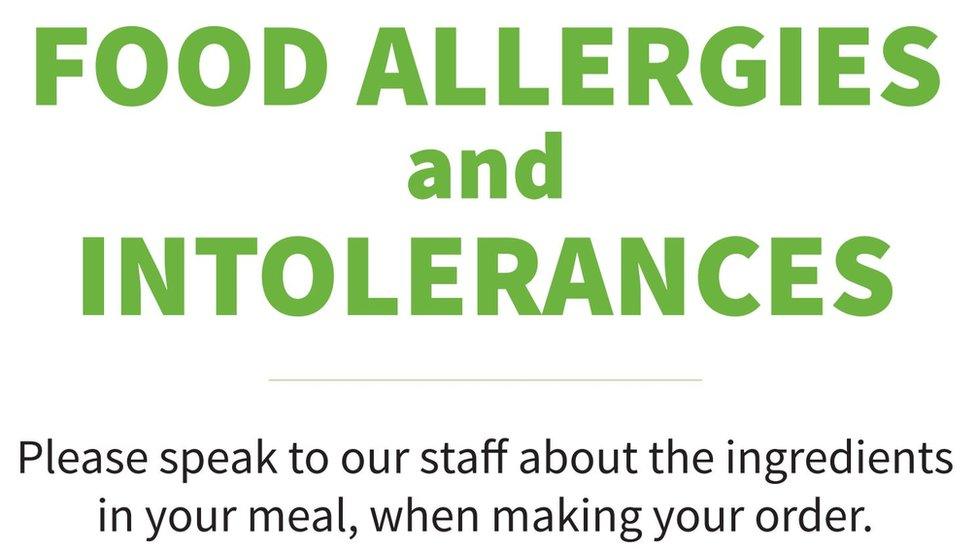Byron burger allergy death: Owen Carey's family demand law change
- Published
Owen Carey's family are calling for better food labelling in restaurants.
The family of a teenager with a dairy allergy who died after he unwittingly ate buttermilk in a burger restaurant have called for a change in the law.
Owen Carey ordered grilled chicken at Byron burger at the O2 Arena in London while celebrating his 18th birthday.
He told staff about his allergy but was not told the meal included buttermilk.
After a coroner ruled he was not told about allergens that led to his death, Mr Carey's family said the current policy left too much room for error.
Speaking outside Southwark Coroner's Court, Mr Carey's sister Emma Kocher said her brother's death should not have happened.

Owen Carey was celebrating his 18th birthday when he died
She said the family wanted something good to come out of their loss and were calling on the government to change the law.
"It's simply not good enough to have a policy which relies on verbal communication between the customer and their server, which often takes place in a busy, noisy restaurant where the turnover of staff is high and many of their customers are very young," she said.
"This leaves far too much room for error on an issue we know far too well can cost lives. We hope we can bring about change with Owen's Law for better allergen labelling in restaurants."
Mr Carey's mother Moira paid tribute to her son, who she said played three instruments, filled the house with noise, and was "always smiling and wanted to get the most out of life".
She said "hundreds of thousands" of allergy sufferers were scared to eat out in restaurants because that was "the key place where they are at risk".
His father Paul simply described his son as "an excellent chap, a beautiful boy and a great mate".
'Severe anaphylactic reaction'
The parents of Natasha Ednan-Laperouse, 15, who died after eating a Pret A Manger baguette containing sesame seeds, have called the ruling a "landmark judgement".
Earlier, assistant coroner Briony Ballard ruled: "The deceased made serving staff aware of his allergies.
"The menu was reassuring in that it made no reference to any marinade or potential allergenic ingredient in the food selected.
"The deceased was not informed that there were allergens in the order.
"The food served to and consumed by the deceased contained dairy, which caused the deceased to suffer a severe anaphylactic reaction from which he died."

The inquest heard Mr Carey ate half the chicken before he experienced symptoms
The inquest heard Mr Carey died on 22 April 2017 as he celebrated his 18th birthday with family and friends.
He ate half of his chicken before he felt his lips tingling and experienced stomach problems, the hearing was told.
The teenager collapsed 55 minutes later outside the London Eye.
Members of the public, including an RAF doctor, tried to revive him but when paramedics arrived he was "silent, not breathing and pulseless", the hearing was told.
Mr Carey, from Crowborough, Sussex, died later at St Thomas's Hospital in central London.

Natasha Ednan-Laperouse died after an allergic reaction to a Pret A Manger baguette in 2016
After the hearing, Byron chief executive Simon Wilkinson said: "We take allergies extremely seriously and have robust procedures in place and although those procedures were in line with all the rules and guidelines, we train our staff to respond in the right way."
He said the company had heard what the coroner had said about talking to customers and added: "It's clear current rules and requirements are not enough and the industry needs to do more - more to help customers with allergies and more to raise awareness of the risks of allergies."
Ms Ballard is expected to make recommendations at a later date about how to prevent future deaths.
After the hearing, Thomas Jervis, the Carey family's lawyer from Leigh Day, said no family should have to endure the same heartbreak.
He said: "The food regulations relating to allergy information are clearly not fit for purpose.
"It cannot be right that there is such room for human error on an issue that can be fatal."
The law firm said Mr Carey's order was described on the menu as "Classic Chicken - grilled chicken breast, shredded iceberg, tomato, red onion, pickles, Byron sauce".
Nadim and Tanya Ednan-Laperouse said there were remarkable parallels between their daughter's death and Mr Carey's.
They said Mr Carey's death highlighted the inadequacy of food information, adding: "This verdict is a landmark judgment for millions of allergy sufferers in this country and another clear statement to the food industry that things cannot go on as they are."

What is the law on food allergy labels?
There are 14 allergens that food providers must alert people to, external, including nuts, milk and eggs.
Pre-packed food must have an ingredients list and, under "Natasha's Law" which is due to come into effect on 1 October 2020, allergens must be emphasised in some way every time they appear.
For non pre-packed food, such as that sold in a restaurant, information for every item that contains any of the 14 allergens must be provided.

The FSA provides this sign for restaurants to put up
According to the Food Standards Agency, this could be either on a menu, chalkboard or information pack, or through a written notice like the sign above explaining how customers can find out more information, for example by asking a member of staff for details.
But Mr Carey's family said this "leaves far too much room for error".
They want it written beside each item on the menu which contains an allergen.
- Published12 September 2019
